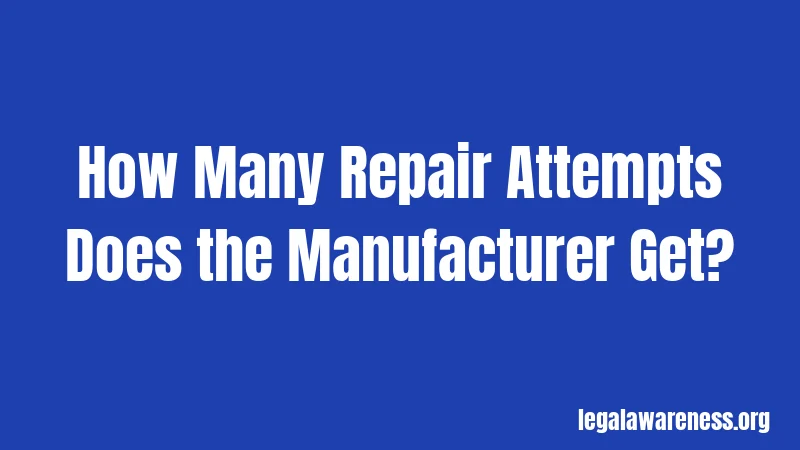Missouri Lemon Laws (2026): When Your New Car Goes Wrong
Most people have no idea this law even exists. Seriously. But in Missouri, if you buy a defective new car, you have real legal protection. The manufacturer can’t just keep asking you to fix the same problem over and over. We’re going to break down exactly what you need to know about Missouri’s lemon law—and how it can actually help you get your money back.
Trust me, this matters. You could save yourself thousands of dollars.
What Is a Lemon in Missouri?

A “lemon” is a brand-new car with a serious defect. That defect has to substantially impair how the vehicle works, its safety, or its market value. Think of it like this: a defect isn’t a problem you can live with. It’s something that really gets in the way of using your car.
Here’s what Missouri considers a defect:
The vehicle doesn’t work properly compared to what the manufacturer promised. The defect affects whether you can safely drive the car. The defect lowers the car’s resale value. In other words, the problem has to be real and serious—not just annoying. If the manufacturer’s warranty covers it, Missouri’s lemon law steps in to protect you.
Basic Missouri Lemon Law Requirements
What Vehicles Are Covered?
Missouri’s lemon law applies specifically to new cars. Here’s the key detail: your vehicle must be brand new. It cannot have been registered or titled anywhere before you bought it. This includes:
New cars and trucks that come straight from the dealer. Demonstrator vehicles with a manufacturer’s warranty. Lease-purchase vehicles (where you eventually own the car).
Not sure if your vehicle qualifies? Let me break it down. If you bought it used, the lemon law doesn’t apply—even if it’s practically new and the factory warranty is still active. Sorry, that’s just how it works. If you leased it without an option to buy, you’re not covered either. And commercial vehicles, motorcycles, mopeds, and recreational vehicles aren’t covered (except for their engines, powertrains, and certain parts).
When Do You Have to Report Problems?
Here’s where timing gets important. You must report the defect to the manufacturer within one year of the original delivery date. Alternatively, you can report it during the warranty period—whichever one ends first.
Sounds straightforward, right? Here’s a quick example. You buy a car on January 15, 2024. The manufacturer’s warranty runs for three years. You’d have until January 15, 2025 to report any defects, even though your warranty lasts much longer. That one-year deadline is what matters.
Why the rush? The law wants to make sure you report problems while everything is still fresh. This gives the manufacturer a fair chance to fix things while the vehicle is new.
How Many Repair Attempts Does the Manufacturer Get?

Okay, pause. This part is important. Missouri gives manufacturers four chances to fix the same problem. Not four tries total. Four tries for the exact same defect.
Here’s how it works:
You take your car to the dealer because of a problem. The manufacturer tries to fix it (attempt 1). The problem still exists. You go back (attempt 2). Still broken. Back again (attempt 3). Same issue. One more time (attempt 4). At this point, if the problem persists, you have legal grounds for relief.
Or here’s another scenario. Your car gets fixed, but the repairs take so long that your vehicle sits in the shop for 30+ working days (not all at once—they can add up). Either way, you have a case.
Pretty straightforward, honestly.
Written Notification Is Required
Before you can move forward with a lemon law claim, you must notify the manufacturer in writing about the problem. You can’t just call the dealer and complain. You need written documentation.
This notification does two things:
It gives the manufacturer official notice of the defect. It starts the clock on their final repair opportunity. When the manufacturer receives your written notice, they’re required to give you one last chance. They’ll direct you to an accessible repair facility and have 10 calendar days to fix the problem.
What Happens If the Manufacturer Can’t Fix It?
After those 10 days pass, if your car still isn’t fixed, the next step is arbitration. Most car manufacturers have informal dispute settlement procedures. Basically, that’s a fancy name for arbitration. An independent panel reviews your case and makes a settlement offer.
You don’t have to accept that offer. It’s totally your choice. Many people do accept it because it’s quicker than going to court. But you can reject it and file a lawsuit instead.
This is important stuff. That’s why talking to a lemon law attorney makes sense at this point. They can review the offer and give you honest advice.
Your Rights and Remedies

If your vehicle qualifies as a lemon under Missouri law, you have options. The manufacturer must either replace the vehicle or refund your full purchase price.
Wait, it gets better. The refund includes more than just what you paid. Here’s what you can recover:
The full purchase price of the vehicle. All collateral charges (sales tax, license fees, registration fees, title fees, inspection costs). Costs and expenses you paid, including attorney’s fees. All reasonable costs related to your lemon law claim.
There’s one catch. The manufacturer can deduct a small amount for your use of the vehicle. This is basically wear-and-tear. If you drove the car 5,000 miles before reporting the problem, they can reduce the refund slightly. But they can’t dock you a huge amount just because you owned it for a few months.
When you get a refund or replacement, the vehicle’s title is clear. You never have to disclose the lemon law settlement to future buyers (in most cases). The car’s warranties stay in effect if you accept a replacement vehicle.
The Timeline: When You Must Act
Honestly, this is the part most people miss. You’ve got deadlines, and missing them costs you your entire claim.
Here are the key dates:
Report the problem within one year of receiving the vehicle (or within the warranty period, whichever comes first). File your lemon law claim within 18 months of the original delivery date. Alternatively, file within six months after the warranty expires—whichever is earlier. If arbitration happens, you have 90 days after the arbitration panel makes its decision to file a lawsuit.
Missing these deadlines? Your case is done. You lose all rights under Missouri’s lemon law.
This is why it’s worth getting help early. An attorney can make sure you don’t miss critical deadlines.
Manufacturing Defect vs. Your Own Neglect
Hold on, there’s important information coming. The manufacturer can argue that the defect isn’t their responsibility. They call these “affirmative defenses.” Here are the main ones:
The defect resulted from abuse or neglect on your part. You made unauthorized modifications or alterations to the vehicle. The defect doesn’t actually impair the vehicle’s use, safety, or value. You filed the claim in bad faith (basically lying to get money).
If you’ve been ignoring maintenance, skipped oil changes, or drove aggressively, the manufacturer can use that against you. They’ll argue the defect is your fault, not theirs. That’s why keeping detailed service records is crucial. Show that you maintained the car properly.
Special Circumstances
What About Leased Vehicles?
Here’s where it gets confusing. Regular leased vehicles aren’t covered by Missouri’s lemon law. But if you have a lease-purchase agreement (where you eventually buy the vehicle), you might be covered. The key is whether a manufacturer’s warranty was issued as part of the deal.
When in doubt, ask. A lawyer can clarify your specific situation.
What About the Federal Lemon Law?
Missouri also falls under the federal Magnuson-Moss Warranty Act. This is your backup plan. It covers vehicles that have problems during the manufacturer’s warranty period, even if they don’t meet Missouri’s specific lemon law requirements.
Think of it like extra protection. You might not qualify under the state law, but the federal law could still help you. And honestly, the federal law gives you four years instead of 18 months. That’s a much longer window to file a claim.
Can You Get Attorney’s Fees?
Yes. If you win your case, the court orders the manufacturer to pay your attorney’s fees. This is huge because it means you can hire a lawyer without paying anything upfront. The lawyer only gets paid if you win and recover money.
Most Missouri lemon law attorneys work on a “no win, no fee” basis. You don’t pay a dime unless the manufacturer settles or loses in court. And when they pay, the bill goes to them, not to you.
Step-by-Step: What You Need to Do
Here’s what you should do right now if you think you have a lemon:
Step 1: Document everything. Keep copies of repair orders, work tickets, correspondence with the dealer, and a timeline of problems. Take photos of any issues. Write down dates and mileage when problems occur.
Step 2: Send written notice to the manufacturer. Don’t just call. Send a certified letter or email to the manufacturer’s lemon law department. Explain the defect clearly. Include repair dates, mileage, and the specific problems you’ve experienced.
Step 3: Give them one final repair opportunity. The manufacturer gets 10 calendar days to fix the issue at an authorized facility. Wait for this repair attempt. Don’t skip this step—the law requires it.
Step 4: If it’s still broken, pursue arbitration or legal action. If the manufacturer has an arbitration program, you might need to go through that first. Review their offer carefully.
Step 5: Contact a lemon law attorney. Seriously, do this early. They can guide you through the rest of the process, file deadlines, and represent you if needed. Many offer free consultations.
Frequently Asked Questions
What if my car has multiple different problems, not just the same defect repeated? Missouri’s law applies to any nonconformity that impairs the vehicle’s use, value, or safety. You don’t need the same exact problem four times. You could have different issues that add up (brake problems, transmission issues, electrical failures) and still qualify if the car has spent 30+ days in the shop or you’ve taken it in for repairs more than four times for various issues.
How long does the arbitration process take? Most arbitration cases resolve within a few weeks to a couple of months. But you have 90 days after the panel decides to file a lawsuit if you disagree with their offer. The whole thing can take several months if you go to court afterward.
Can I keep driving the car while I’m pursuing a lemon law claim? Yes, you can. But be aware that if you keep driving it and it accumulates a lot of mileage, the manufacturer might deduct more for “use” if you get a refund. The more miles you drive, the bigger the deduction. That said, if the car is unsafe, don’t drive it.
What if the dealer keeps saying it’s not a defect, just normal wear? Document everything and get a second opinion from an independent mechanic. Get a written assessment that confirms the problem. That documentation becomes very valuable. Then contact a lemon law attorney with your evidence.
Am I protected if I just discovered this problem after 13 months? Not under Missouri’s lemon law. You must report the problem within 12 months of delivery. However, the federal Magnuson-Moss Warranty Act gives you four years. If the vehicle still has manufacturer’s warranty coverage, you might have a federal claim even if Missouri’s law doesn’t apply.
Final Thoughts
Missouri’s lemon law is there to protect you. Manufacturers can’t sell you a defective car and then expect you to keep paying for repairs. They get a fair chance to fix it, but if they can’t—or won’t—you have legal remedies.
Stay on top of your deadlines. Document everything. Get professional help early. And remember, you don’t pay attorneys’ fees yourself. The manufacturer pays when you win.
You invested significant money in that vehicle. You deserve a car that works. If you’re stuck with a lemon, take action. Now you know your rights.
References
- Missouri Lemon Law Statutes (Missouri Revised Statutes Sections 407.560-407.579) – https://revisor.mo.gov/main/OneSection.aspx?section=407.560
- Missouri Lemon Law Information – Krohn & Moss Consumer Law Center – https://www.yourlemonlawrights.com/missouri-lemon-law
- Kimmel & Silverman Missouri Lemon Law Guide – https://www.lemonlaw.com/missouri/
- Missouri Lemon Law Overview – Allen Stewart PC – https://allenstewart.com/lemon-laws-by-state/missouri-lemon-law/
- Missouri Lemon Law Standards and Consumer Rights – https://thelemonlawattorneys.com/missouri-lemon-law/
- Better Business Bureaus Auto Line Lemon Law Summary – https://assets.bbbprograms.org/docs/default-source/auto-line/lemon-law-summaries/mo-ll-summary.pdf
- Federal Magnuson-Moss Warranty Act Information – https://www.consumer.ftc.gov/articles/0361-lemon-laws
- Missouri Attorney General Consumer Protection Division – https://ago.mo.gov/consumers
